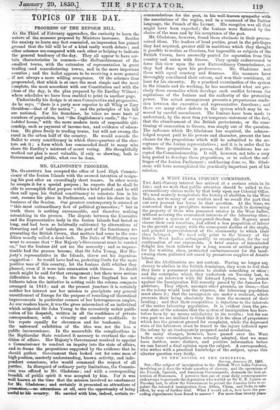MR. GLADSTONE'S PROGRESS.
Mn. Gn,ingroxE has accepted the office of Lord High Commis- sioner of the Ionian. Islands with the avowed intention of resign- ing his post after an exceedingly short tenure. In other words he accepts it for a special purpose ; he expects that he shall be able to accomplish that purpose within a brief period ; and he will then call upon, his Oxford constituency to reinstate him in his seat, resume his place in Parliament, and take his share in the business of the Session. Our greatest contemporary is amused at "this most extraordinary feat of political gymnastics;" but in truth there is nothing unreasonable, and therefore nothing astonishing in the process. The dispute between the Executive and the Representative body in the Ionian Islands had lasted so long, and had been so habitually cultivated by alternations of thwarting and of indulgence on the part of the functionary re- presenting the British Crown, that matters had come to the con- dition usually called a dead-lock. The Duke of Wellington was wont to assume that "Her Majesty's Government must be carried on," but the Ionians did not see the necessity ; and so imprac- ticable had the process become, that Sir John Young, Her Ma- jesty's representative in the Islands, threw out his ingenious suggestion : he would have had us, pocketing Corfu for the more positive uses of this country, let the Ionians drift whither they pleased, even if it were into annexation with Greece. No doubt much might be said for that arrangement ; but there were serious difficulties in the way. In the first place England has not hitherto taken the initiative in setting aside the solemn compacts arranged in 1815; and at the present juncture it is certainly neither her interest nor her mission to precipitate any general unsettlement of Europe for the purpose of rounding off theoretical improvements in particular corners of her heterogeneous empire. As our readers know, it was the gross misconduct of an individual which subjected Sir John Young to the excessively unfair publi- cation of his despatch, written in all the confidence of private correspondence, with a vivacity and candour creditable to his repute equally for cleverness and for bonhomie. But the untoward exhibition of the idea was not the less a public inconvenience. In the meanwhile the complications in the Septinsular State rendered it necesary to overhaul the con- dition of affairs. Her Majesty's Government resolved to appoint a Commissioner to conduct an inquiry into the state of affairs, and to frame the propositions suggested by the evidence that he should gather. Government then looked out for some man of high position, masterly understanding, known activity, and inde- pendent conscience, who would command the respect of all parties. In disregard of ordinary party limitations, the Commis- sion was offered to Mr. Gladstone ; and with a corresponding breadth of public spirit it was accepted by him. For it NFU well known at the time that the mission involved no emolument for Mr. Gladstone ; and certainly it presented no attractions of promotion,—no attractions at all, save the opportunity of being useful to his country. He carried with him, indeed, certain re-
commendations for the post, in his well-known sympathy with the associations of the region, and in a command of the Italian language, the French of the Levant. His reception was all that might have been expected ; the Ionians were flattered by the choice of the man and by his acceptance of the post.
Mr. Gladstone, however, found them obstinate in their precon- ceived ideas. The leaders of local parties, great in the privileges they had acquired, greater still in ambitions which they thought it possible to realize as Grecians, but impossible as subjects of the British Crown, have avowedly panted for separation from this country and union with Greece. They openly endeavoured to force this view upon the new Extraordinary Commissioner, as they had done upon his predecessors. Mr. Gladstone met them with equal courtesy and firmness. His manners have thoroughly conciliated their esteem, and won their confidence, at least for his sincerity. By a practical examination of the system in the islands and its working, he has ascertained what are pre- cisely those anomalies whieh develop° such conflict between the aspirations of the Ionians and the authority of the protecting power. The actual arrangement presents a preposterous confu- sion between the executive and representative functions ; and there are many other defects in the system which may be re- moved by careful amendment. The Ionians have been made to understand, by the most firm yet temperate statement of the fact, that the abandonment of the British protectorate, or the sanc- tioning of annexation to Greece, was simply out of the question. The influence which Mr. Gladstone has acquired, the acknow- ledged respect paid to his powers and character, present the best chance for the propositions which will be submitted to the ac- ceptance of the Ionian representatives ; and it is in order that he make those propositions in person, that Mr. Gladstone has ac- cepted the Cominissionership. It will, however, not take a very long period to develope those propositions, or to collect the suf- frages of the Ionian Parliament ; and having done so, Mr. Glad- stone will have accomplished the practically important part of his mission.


























 Previous page
Previous page